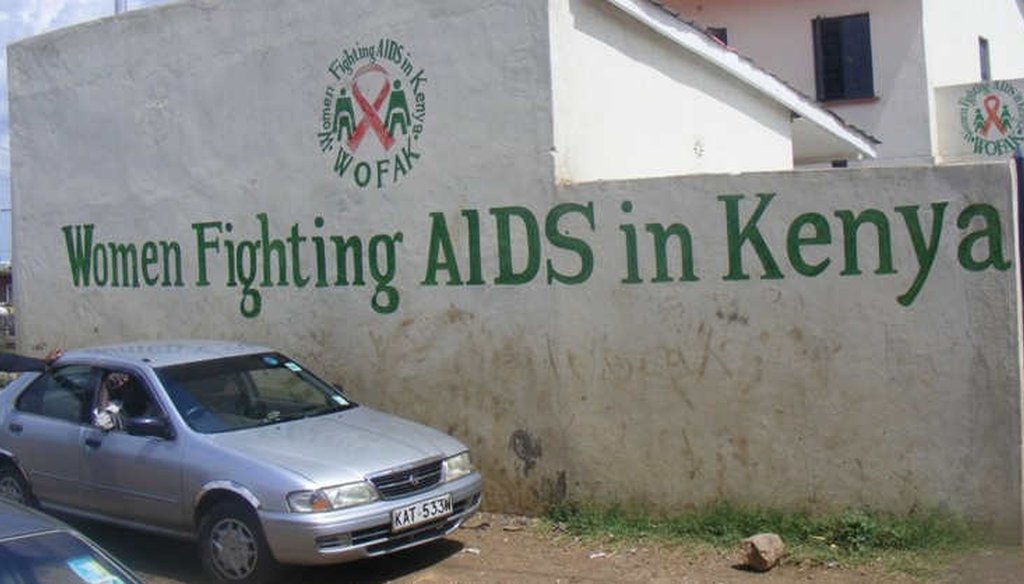

Our only agenda is to publish the truth so you can be an informed participant in democracy.
We need your help.


Office of an AIDS response group in Kayole, Kenya (Afyajoe blog)
At the launch of a new political party at a sports stadium in Nairobi, Kenya, the country’s deputy president William Ruto talked about a disease that Vice President Joe Biden has made his life’s mission. At the start of the year, following the death of Biden’s son to brain cancer, the vice president took the lead in the administration’s Cancer Moonshot project, an effort to rapidly accelerate cancer research.
Ruto cast cancer as a top public health priority for his country.
"Cancer and matters to do with kidney failure kill more people in Kenya today than malaria, tuberculosis and AIDS combined," Ruto said Sept. 9, 2016.
Given that AIDS is the No. 1 killer in sub-Saharan Africa, and malaria ranks fourth, our Africa Check partners decided to check Ruto’s numbers. He is wrong.
For the record, Ruto’s office did not provide any supporting data.
A dearth of numbers
Solid data is sorely lacking in Kenya as it is in most sub-Saharan African nations. But the numbers that are available disprove Ruto’s claim.
Kenya just launched a national cancer registry, but it won’t be fully in place until 2019. For the time being, the highest estimate puts the number of cancer deaths at 28,000 in 2015.
On kidney disease, Kenya has no national data at all. The World Health Organization estimates 3,100 deaths for 2014.
Combined that’s a rough count of 31,100 deaths.
WHO is the most reliable source for tuberculosis death estimates in Kenya as well, with about 9,400 deaths in 2014.
The United Nations AIDS program relies on statistical models to derive the number of AIDS deaths in Kenya. UNAIDS says it is "logistically impossible and ethically problematic" to investigate all deaths. According to its statistical model, there were between 28,000 and 50,000 deaths due to AIDS in Kenya in 2014, with 38,000 being the most likely figure.
For malaria, the WHO said in its World Malaria Report for 2015 that it was unable to collect data for six East African countries, including Kenya, between 2000 and 2014 because of "inconsistent reporting, or changes in health service accessibility or diagnostic testing".
The best we could find for malaria deaths was Kenya’s civil registration data, which provisionally shows 23,789 deaths in 2013 and 20,691in 2015.
As you can see, while the numbers are far from perfect, they do not support Ruto’s point.
This table pulls the numbers together. Even using the lowest estimates for AIDS and malaria deaths, the combined toll is greater than for cancer and kidney disease.
Cancer/Kidney deaths
AIDS/Malaria/TB deaths
Cancer
28,000
Kidney disease
3,100
AIDS
28,000
Malaria
20,691
TB
9,400
Totals
31,100
58,091
There are efforts such as the Health Data Collaborative and the African Health Initiative that aim to beef up the health data collected in sub-Saharan Africa. But it will be a tough slog.
Robert Black at the Johns Hopkins School of Public Health helps oversee the data coordination program at the African Health Initiative and he told us it will take many years before these countries have robust systems.
"The funding that is available for this from both national and donor funds is grossly inadequate to reach that objective in the near term," Black said.
In May 2016, Kenya became the first African country to launch a national effort to ramp up its systems for collecting health data. One of the top priorities? Making sure that every death and cause of death is recorded.
Our ruling
Ruto said that cancer and kidney disease "kill more people in Kenya today than malaria, tuberculosis and AIDS combined." The precision of the numbers leaves a lot to be desired, but based on the best estimates, Ruto isn’t even close. Using conservative estimates, deaths from AIDS, malaria and tuberculosis are double those from cancer and kidney disease.
We rate this claim False.
https://www.sharethefacts.co/share/42cfbfc2-add3-4a77-a21f-08cd7bd7015eAfrica Check, Do cancer & kidney failure kill more Kenyans than malaria, TB & AIDS?, Sept. 28, 2016
PolitiFact, Joe Biden says cervical cancer 'totally preventable' in Africa, May 5, 2016
PolitiFact, Tracking global poverty: Do we have the real numbers?, July 7, 2016
Kenya Citizen TV, Ruto's Closing Speech at Jubilee Grand Merger, Sept. 9, 2016
Health Data Collaborative, Kenya health data collaborative roadmap, May 18, 2016
Health Data Collaborative, A conversation with Kenya Ministry of Health's Dr. Isabella Maina, June 23, 2016
Email interview, Robert Black, professor of international health, Johns Hopkins School of Public Health, Oct. 11, 2016
In a world of wild talk and fake news, help us stand up for the facts.
